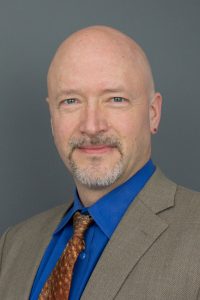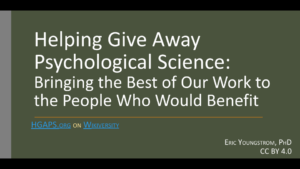Eric A. Youngstrom, Ph.D.
Professor of Psychology and Psychiatry at UNC-CH
Welcome!

Vision: Share psychological science to help improve lives.
Mission: Bridge the science-practice gap by collecting, distilling, and sharing psychological science for mental health providers and promoting well-being in the community.
Eric Arden Youngstrom, Ph.D., is a professor of Psychology and Neuroscience, and Psychiatry at the University of North Carolina at Chapel Hill. He is also the Acting Director of the Center for Excellence in Research and Treatment of Bipolar Disorder, the first recipient of the Early Career Award from the Society of Child and Adolescent Clinical Psychology, and an elected full member of the American College of Neuropsychopharmacology. Dr. Youngstrom is a fellow of the American Psychological Association (Divisions 5, 12, and 53), the Association for Psychological Science, and the Association for Behavioral and Cognitive Therapies. He consulted on the 5th Revision of the Diagnostic and Statistical Manual (DSM-5) and the International Classification of Diseases (ICD-11). He chairs the Work Group on Child Diagnosis for the International Society for Bipolar Disorders and the Advocacy Task Force. Dr. Youngstrom is a licensed clinical psychologist specializing in the relationship between emotions and psychopathology and the clinical assessment of children and families. He earned his Ph.D. in clinical psychology at the University of Delaware and completed his predoctoral internship training at Western Psychiatric Institute and Clinic before joining the faculty at Case Western Reserve University.
Dr. Youngstrom enjoys working with graduate students in the Developmental, Quantitative, and Clinical Program. His passion while teaching assessment and therapy, developmental psychopathology, archival data, research design, and multivariate statistics has earned him the Tanner, Carl F. Wittke, Glennan Fellowship, and the Northeastern Ohio Teaching Awards, Psychology Club’s Excellence in Research Mentoring Award, the Elizabeth Hurlock Beckman Award, and the Larry Cohen Mentorship Award from the Society for a Science of Clinical Psychology.
His research improves clinical assessment instruments for making better differential diagnoses, predictions about future functioning, and monitoring of treatment progress, especially for bipolar disorder. Dr. Youngstrom speaks internationally about pediatric bipolar disorder, assessment, and modernized dissemination and implementation science (DIS). Dr. Youngstrom has more than 300 peer-reviewed publications in over 90 different journals about clinical assessment, emotion, and statistics. He has served on prominent editorial boards and provided ad hoc reviews for more than 70 psychology and psychiatry journals. Since 2018, in an effort for open science, he has served as an editor on the WikiJournal of Medicine Editorial Board.
The NIMH (since 2002), the Ohio Department of Mental Health, and multiple foundations have awarded Dr. Youngstrom with grants. He is a two-time Past President of the Society of Clinical Child and Adolescent Psychology and served as president of Division 5 of the American Psychological Association (Qualitative & Quantitative Methods).
Most notably, Dr. Youngstrom is the proud Co-Founder, and Executive Director of Helping Give Away Psychological Science(HGAPS). This 501c3 nonprofit service-based education organization brings the best psychological information to the most who will benefit from it. He earned the Beckman Award from the American Psychological Association and Wells Fargo in 2020 for inspiring students to build HGAPS.
Current Research Focus:
Quick Research Links:
- MECCA Lab’s Research Interests
- My GoogleScholar
- My ORCiD
- My PubMed indexed paper list
- My Scholia record shows how my work looks through the lens of Wikidata, which connects to my Research Identifiers and more
- My publications on ResearchGate.
- HGAPS Linktree for all the links you will ever need about HGAPS
- I also actively edit Wikipedia, Wikiversity, and other Wiki platforms. Here is my Wikipedia account page and my Meta Wikimedia user page.
LAB UPDATES:
I share aspects of everything I am doing professionally with Helping Give Away Psychological Science (HGAPS.org). My research, teaching, and service activities are all being reshaped with sharing as a core objective. HGAPS is growing and more prominent than the lab. In a Venn diagram, my lab is just a circle inside of HGAPS.
I do NOT anticipate taking a new graduate student into the lab for the next school year (2024-2025, applying fall 2023).
I am not able to reply individually to emails about graduate applications this fall.


University Operator: (919) 962-2211 | © 2024 The University of North Carolina at Chapel Hill |